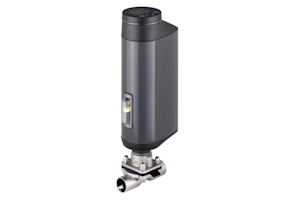Electric Diaphragm Valve Applications

Figure 1: An electric diaphragm valve
Electric diaphragm valves, distinguished by their automation capabilities and precision control, are central in modernizing fluid management across various industrial sectors. These valves, powered by electric actuators, offer unparalleled control over the flow of a wide range of media, from aggressive chemicals to pure pharmaceutical formulations. Their ability to facilitate remote operation and integrate seamlessly into automated systems makes them critical in industries seeking efficiency, safety, and reliability. This article will explore the unique advantages of electric diaphragm valves, focusing on their designs, operational benefits, and the specific applications they excel in, underscoring their critical role in contemporary industrial processes.
View our online selection of diaphragm valves!
Benefits of having an automatic diaphragm valve
- Increased precision: Electric actuation allows for finer control over the valve position, resulting in more accurate flow regulation.
- Enhanced safety: Reduces the need for manual operation in potentially hazardous environments, improving safety for personnel.
- Operational efficiency: Automation can significantly reduce the time and labor associated with adjusting valve positions, leading to increased operational efficiency.
- Remote operation: The ability to control valves remotely allows for a more flexible system design and can improve response times to changes in system requirements.
Electric diaphragm valve designs
Electric diaphragm valves incorporating advanced actuation technology are available in weir-type and straight-through designs. Each benefits from the precision and efficiency that electric actuation provides. Both types are suitable for applications requiring a high degree of cleanliness, such as pharmaceuticals and food processing.
- Electric weir-type diaphragm valves: Electric weir-type diaphragm valves are ideal for managing slurry or semi-solid materials with little clogging. While not typically used for high-pressure situations, electric actuators enhance their ability to handle varying pressures by improving flow control.
- Electric straight-through diaphragm valves: Electric straight-through diaphragm valves ensure a precise, uninterrupted flow perfect for handling pure fluids or gasses. This setup focuses on maintaining an open flow path, which is essential for applications needing little to no disruption in fluid or gas movement. Electric actuation improves these valves for high-pressure situations by effectively controlling flow resistance.
Electric diaphragm valve applications
Electric diaphragm valves are commonly used in applications requiring precise flow regulation and remote operation, including diaphragm gas valve applications where safety and precision are paramount.
- Automated process systems: Utilized in sectors requiring constant flow adjustments or specific flow rates, such as chemical manufacturing, without manual intervention.
- Remote control applications: Perfect for operations in hazardous conditions or hard-to-reach areas, ensuring safety and efficiency through remote valve operation capabilities.
- Water treatment and irrigation: Facilitates accurate water flow management, which is crucial for optimizing resource use and enhancing the efficiency of water treatment plants and irrigation systems.
- Pharmaceutical manufacturing: Ensures precise control over the flow of sterile and sensitive fluids, which is critical in producing pharmaceuticals where contamination must be avoided.
- Food and beverage processing: Used in processes requiring strict hygiene and precise flow control to maintain product quality and safety, from ingredient handling to cleaning in place (CIP) systems.
- Biotechnology and life sciences: Supports the handling of culture media, reagents, and other sensitive materials in bioreactors and other biotech equipment, where exact flow rates are essential.
- Semiconductor manufacturing: Provides the control needed for handling high-purity chemicals and gasses in the fabrication of semiconductors, where contamination can compromise product integrity.
- Pulp and paper industry: Aids in precisely adding chemicals for pulp treatment and bleaching processes, where flow accuracy impacts product quality and process efficiency.
- Mining and mineral processing: Useful in the controlled addition of reagents for extraction processes and wastewater treatment, where precise dosing and remote operation are beneficial.
- HVAC systems: Employed in heating, ventilation, and air conditioning systems for precise control over water or other media flow, contributing to energy efficiency and system performance.
Diaphragm valve materials
The above section highlights the broad range of applications electric diaphragm valves are suitable for. Fortunately, there is an equally broad range of material selection for diaphragm valves, ensuring the correct materials are being used and preventing unnecessary wear and tear or device failure. Read our article on diaphragm valve materials to learn more.
FAQs
What is a diaphragm gas valve and its use?
A diaphragm gas valve controls the flow of gas in pipelines or appliances, ensuring safe and precise gas delivery by adjusting the diaphragm position.
Why choose diaphragm valves for fluid control?
Diaphragm valves offer precise flow control, high reliability, and are suitable for corrosive, viscous, or particulate-laden fluids.
How do electric diaphragm valves work?
Electric diaphragm valves work by using an electric actuator to move a diaphragm, which opens or closes the valve, controlling the flow of media through the valve.





